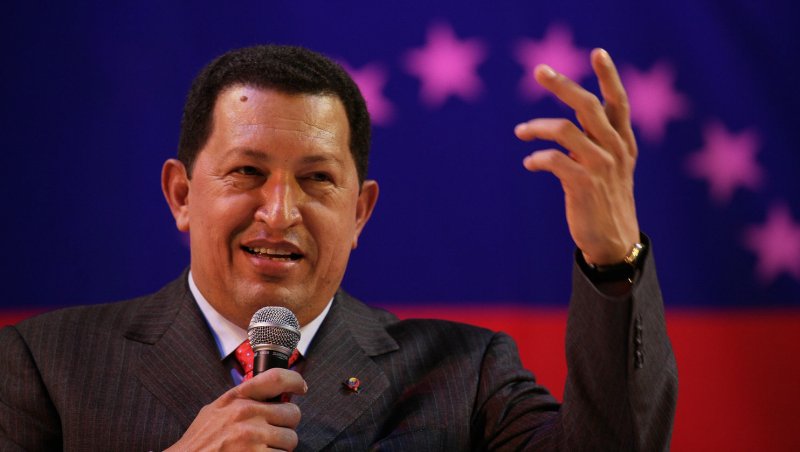1 of 9 | Venezuelan President Hugo Chavez speaks to supporters at a rally in London hosted by London mayor Ken Livingstone at Camden town Hall in London on Sunday May 14 2006. Mr Chavez is in London for a two-day visit where he will meet British dignitaries and trade union leaders.(UPI Photo/Hugo Philpott) |
License Photo
CARACAS, Venezuela, March 5 (UPI) -- Venezuelan President Hugo Chavez died Tuesday, Vice President Nicolas Maduro announced in a televised address. Chavez was 58.
Maduro's announcement that Chavez died at 4:25 p.m. came after the government said Chavez suffered from a severe respiratory infection caused by an immune system weakened by his medical condition.
Chavez recently returned to Venezuela from Cuba where he received treatment for cancer. Chavez was aware of his condition and was complying with a treatment plan designed by his medical team, Villegas said.
Hugo Rafael Chavez Frias, who was elected president of Venezuela in December 1998, was born July 28, 1954, in Sabaneta, Barinas, the son of a schoolteacher father.
Chavez joined the Venezuelan army at age 17 and graduated at 21 as a commissioned officer from the Venezuelan Academy of Military Sciences. He attended college while in the military, majoring in political science at Simon Bolivar University, but did not earn a degree.
After his studies, he was assigned to a counterinsurgency unit, the start of a military career during which he served as head of a paratrooper unit and was promoted to the rank of lieutenant colonel in 1990.
A populist, Chavez instituted what he called a "Bolivarian Revolution" in Venezuela, nationalizing key industries and using oil revenues to pay for social programs.
Chavez was a vocal critic of the United States, singling out former President George W. Bush, who he once famously and publicly called a "donkey."
Venezuelans voted in February 2009 to abolish term limits, allowing him to run for re-election indefinitely.
During his military career, Chavez developed what he called "Bolivarianism" -- named for Simon Bolivar, a hero of liberation in northern South America. Chavez formed a secret society within the military, the Movimiento Bolivariano Revolucionario 200, or the Bolivarian Revolutionary Movement 200.
Chavez and other Venezuelans -- civilians and military -- disgusted by what they saw as corrupt Venezuelan politics, attempted to forcibly oust President Carlos Perez in February 1992. Chavez led five squads of soldiers into Caracas, planning to seize control of important targets including the presidential palace, the airport, the defense ministry and the military museum.
The attempted coup failed and Chavez was sent to prison.
However, Perez was convicted in a massive corruption scandal the following year and Chavez was pardoned by President Rafael Caldera in 1994.
He transformed his MBR 200 into a formal political party, the Fifth Republic Movement, and ran for president in 1998, winning the election with 56 percent of the vote.
Taking office in February 1999, he quickly began implementing aspects of his "Bolivarian" brand of socialism. Clinics were set up for the poor, construction projects were approved and social programs were added.
Chavez wanted a new constitution and the people approved first the assembly and then the constitution itself. Among other things, the new constitution officially changed the name of the country to the "Bolivarian Republic of Venezuela." With a new constitution in place, Chavez had to run for re-election, and was easily returned to office in 2000.
Although Venezuela's poor regarded him as a hero, the middle and upper classed opposed his policies. An April 11, 2002, demonstration in support of the national oil company's private sector management turned into a riot when demonstrators marched on the presidential palace and clashed with pro-Chavez forces and supporters.
Chavez briefly resigned and the United States was quick to recognize the replacement government. When pro-Chavez demonstrations broke out all over the country, he returned and resumed his presidency on April 13. Chavez accused the United States of being behind the attempted coup.
Chavez' administration survived a recall vote in 2004, and used the results as a mandate to expand social programs. He emerged as a leader in the new Latin American leftist movement and had close ties with leaders such as Bolivia's Evo Morales, Ecuador's Rafael Correa, Cuba's Fidel Castro and Paraguay's Fernando Lugo.
His administration even survived a 2008 incident when laptops seized from Colombian Marxist rebels seemed to indicate that Chavez was funding them in their struggle against the Colombian government.
Much like his mentor, Castro, Chavez gained much politically from his open antagonism toward the United States. Many Latin Americans see the United States as an economic and political bully that dictates trade terms to weaker nations -- particularly during the George W. Bush administration.
Venezuela's oil reserves are among the largest in the world, and Chavez used much of the profits to improve the nation's infrastructure, education, health and literacy.
Chavez also restricted press freedom and engineered changes that allowed him to stack the Venezuelan Supreme Court with loyalists.
He was widely reviled in the United States for his willingness to deal with rogue nations such as Iran, and he accused Washington of being behind any number of plots to remove or assassinate him. He was criticized for supporting Colombian rebels, publicly denouncing Israel -- leading to the commission of hate crimes against Venezuelan Jews -- and spending enormous sums on Russian-built weapons and aircraft.















